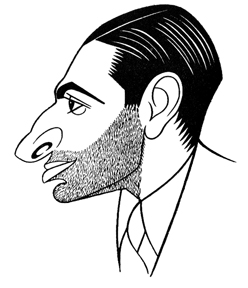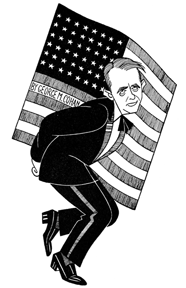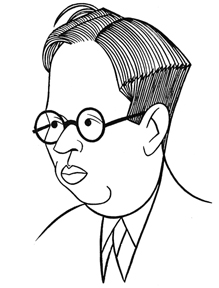Here are 10 things you should know about Alice Brady, born 129 years ago today. A talented and versatile actress on stage and screen, her life and career ended far too soon.
Tag: William A. Brady
Times Square Tintypes: Jed Harris
In this chapter from his 1932 book, Times Square Tintypes, Broadway columnist Sidney Skolsky profiles theatrical producer Jed Harris.
IN GOD’S IMAGE
He is Mrs. Horowitz’s little boy, Jacob. But in the bright lights of Broadway, it’s JED HARRIS.
 Four years ago he knew where the Automat was but he didn’t have the nickel. Today he is worth over a million dollars. In the days when he didn’t have a penny he told everybody he could make a fortune whenever he was ready.
Four years ago he knew where the Automat was but he didn’t have the nickel. Today he is worth over a million dollars. In the days when he didn’t have a penny he told everybody he could make a fortune whenever he was ready.He wears only the top part of his pajamas.
Was born in Vienna and came to this country at the age of three. He has three sisters and one brother.
His personal appearance is a minor thing with him. He has had the same hat since he’s been in the show business. If it isn’t the same hat it looks the same.
Is, however, particular about his shoes. They must always look like new. Every other week he purchases a new pair.
The script of Broadway, originally titled Bright Lights, was rejected by almost every theatrical manager. George M. Cohan turned it down because he didn’t like the characters. William A. Brady because he couldn’t get Tex Guinan to play the hostess. A. H. Woods refused, writing these noble words across the title page: “Not with my money, sweetheart.” On a first reading even Jed Harris rejected it. Six months later, reading it for the second time, he bought it and became famous.
He carries very little money with him. Generally allows someone else to grab the check.
He hates to shave due to the fact that he has “tissue paper” skin. No matter how careful the barber is, his face always bleeds after a shave.
Seldom does he drink. He likes to pretend that he is drunk.
His ambition is to have his own ocean liner.
During rehearsals of a play he is a mad man. For the first couple of weeks he has no confidence in the script. After he has passed through that period he believes he has the greatest play in the world.
Every Friday evening he visits his parents and has noodle soup. They still live in the same house in Newark.
He plays the violin well and is quite adept at card tricks, which he learned from a vaudeville magician. At parties he entertains by reciting complete acts of his plays.
Does most of his work between midnight and four in the morning in the office.
His favorite meal is one consisting of beans, hash, pickles and near beer.
He was fired from the publicity job of a Jewish charity organization by a man who is now doing theatrical interviews for a leading metropolitan newspaper. He has issued a standing order that this man must never be permitted to interview him. He is careful, however, that this interviewer receives aisle seats for all his shows.
With the money he made from Love ‘Em and Leave ‘Em he got married.
No matter who the author or star is, if he doesn’t like the play, he closes it out of town. He tried for two years to get Ina Claire to appear in a play for him. Then he closed that play, The Gaoler’s Wench, forty-eight hours before it was due on Broadway.
He possesses the intuition of a woman.
Once he talked a college chum into taking him to Europe. Quarreled with the chap in Paris. After bumming about London he worked his way back to America in the stokehole of a boat.
He is afraid of old age.
His favorite photograph is the one in which he is sitting on a table with his hands carefully folded in his lap. His shoulders are rounded and his eyes have that faraway look—like a genius.
He can talk anybody into anything.
Works on the script of every play he produces. Always suggests new situations to be written into the play. Twenty-four hours later he telephones the playwright to inquire if the suggested bit has been written. If it hasn’t he merely says: “If you’ll do that you’ll make me very happy” and hangs up.
Dreads the impact of cold water. Whenever he goes to the seashore he sits on the sand all day without going into the water.
He does everything in high gear. Worries about things. Delays doing them until he has worked himself into an emotional state. Then he is a tornado. Nothing can defeat him.
Lives in a duplex apartment in Sutton Place. His second ride in the elevator in that building cost him exactly $212.
Recently in a restaurant a waiter wishing to impress the people at his table pointed and said: “See that man. That’s Jed Harris. He shaves and it comes right out again.”
Noel Coward calls him “Destiny’s Tot.”
On the opening night of his plays he is home sleeping. Whenever he wishes to break an appointment or avoid a tense situation he goes to bed.
His favorite character in all history is Jed Harris.
Times Square Tintypes: Elmer Rice
In this chapter from his 1932 book, Times Square Tintypes, Broadway columnist Sidney Skolsky profiles Pulitzer Prize-winning playwright Elmer Rice.
ELMER THE GREAT
THE 1929 Pulitzer prize play winner: ELMER L. RICE. He was born September 28, 1892. The locale: Madison Avenue near 106th Street. Until he was twenty-six he lived within a radius of two miles of his birthplace.
He likes to go for long walks, wander through museums and look out of windows.
Graduated from public school. Went halfway through high school. He has no recollection of learning anything there of value to him. Later studied law. When he was admitted to the bar he quit the profession.
He is married and has two children—Robert, aged twelve, and Margaret, aged nine.
Hates to get up in the morning. His friends know enough never to disturb him before ten-thirty.
When he finished writing Street Scene he was critically ill. His wife peddled the play, bringing it first to the Theatre Guild. They rejected it and so did John Golden, Jed Harris and Arthur Hopkins. The news that Street Scene had been rejected by these producers was kept from Rice until he recovered from his illness. An agent sold the play to William A. Brady.
He has never been to a night club and never intends going.
Doesn’t care for the theater. He attends about three times a year and then sees musical comedies. Recently, because he has to cast two plays next season, he has been going to the theater three or four times a week. He has yet to see the third act of a play this year.
His name was Elmer L. Reizenstein. The L is for Leopold.
He owns some bum oil stocks.
The first time he ever went to the theater was when he was eighteen years old. Three years later he wrote his first play. It was On Trial. Similar to Street Scene, it was rejected by almost every producer, and then was a big hit when finally produced by Arthur Hopkins. William A. Brady was one of the many who rejected it.
Is especially fond of fat German pretzels and beer.
Times Square Tintypes: George M. Cohan
In this chapter from his 1932 book, Times Square Tintypes, Broadway columnist Sidney Skolsky profiles George M. Cohan, hoofer, song writer, playwright and all-around theatrical giant.
“STARS AND STRIPES FOREVER”
He’s a dancer and a singer and a song writer and a master of slang and an actor and a director and a producer and a playwright and a philanthropist and he’s GEORGE M. COHAN
 The “M” stands for Michael. Hates to be called George by anyone he thinks is not entitled to use it.
The “M” stands for Michael. Hates to be called George by anyone he thinks is not entitled to use it.Comes from a family of hoofers. Later famous as “The Four Cohans.” He was always on the stage. When only a baby his parents parked him backstage in a basket while they did their act.
He is very charitable. Never gives to societies, but takes care of individual cases. This is one subject he will not speak about. Yet without exaggeration he has given away over a million dollars.
At rehearsals he is in the aisles, on the stage and once was discovered halfway up the proscenium.
His finances are in the hands of Dennis O’Brien. Never knew how much money he had and doesn’t today. If left to himself he would write his fortune away. His is one of the wealthiest men in the show business.
His shoes cost $45 a pair. They are handmade. Orders half a dozen pairs at a time.
He sent George Fuller Golden to Colorado for his health. Did this unsolicited and handed Golden $10,000 in cash. Told him to write for more when that was gone. This is merely one of thousands of cases.
Gave his mother the entire royalties of Get Rich Quick Wallingford as a Christmas present.
First man to use the American flag to “stop the show.” Also the first to glorify it on stage. He has been called the “Yankee Doodle Boy.” Is also said to be a representative American type. Of all things, he was born on July 4. The year, 1878.
Nothing that he ever wrote had an unclean line or situation.
He hasn’t temperament. Doesn’t wear the high hat. Just the same old felt or derby tilted on the side.
Prefers the company of theatrical folks.
He writes all his stuff with a yellow pencil on yellow paper.
He is the only man who ever turned out musical comedies single-handed. Beginning with Little Johnny Jones, he has written the music and lyrics, the book, staged the dances, rehearsed the cast and orchestra, arranged settings and costumes, and played in them.
Wrote over one hundred plays and signed only forty.
A great deal of his charity, in addition to money, has been in the form of song numbers and acts. Gave these away to help struggling performers. He didn’t receive any payment nor credit lines. A popular pastime was sending him manuscripts to be “Cohanized.”
After watching a show at a dress rehearsal, he knows exactly how much of it will click. Has never gone wrong on one of these predictions. No man in the world understands the audience as well as he.
He rejected the play Broadway and advised William A. Brady not to produce it.
Was the first actor to own an automobile. He paid $2,000 for it. People said only an actor would do a thing like that.
He does not mourn for “the good old days.” After over twenty years on Broadway he can still compete with the new blood. He considers Broadway of today merely a mess of lights.
Cannot and will not write a part for a Jewish character. He claims he doesn’t understand them.
Is a baseball an prize-fight fan. He is very clever with his fists.
Once he was playing baseball and objected to the presence of a colored chap because the fellow got on his nerves. He tolerated him for two innings. He then picked up a bit and chased him out of the park, down two blocks. All of the players were anxious about Cohen’s safety. When he got back they told him the fellow he chased was Joe Walcott, the prize fighter.
Was the first man to collect royalties for vaudeville skits.
Isn’t particular about his clothes. But is fussy about his haircuts. Often has his Astor Hotel barber cut it three times before he is satisfied.
He has written over a thousand songs. He thinks of the music and lyrics of a new song at the same time. The bugle called and he wrote “Over There” in five minutes. The original copy of “Over There” is now in the Harvard Museum among rare and precious American manuscripts.
Times Square Tintypes: William A. Brady
In this chapter from his 1932 book, Times Square Tintypes, Broadway columnist Sidney Skolsky profiles William A. Brady, prominent actor, theatrical producer, and sports promoter and father to Hollywood actress Alice Brady.
“THE GAMBLER FROM THE WEST”
William A. Brady. Everybody calls him “Pop.”
He owns five watches but never carries one. Always guesses the time, and is fairly accurate.
 Was born in San Francisco, June 19, 1863. Until he was five years old he had a Chinese lady for a nursemaid.
Was born in San Francisco, June 19, 1863. Until he was five years old he had a Chinese lady for a nursemaid.Lost a million dollars many times. He owned Within the Law and sold his rights to Arch Selwyn for $10,000. The play netted over a million. Jeanne Eagels brought him the script of Rain to produce. He said: “I no like.” Had Broadway in rehearsal and shelved it on the advice of George M. Cohan. That was another million. He was to be one of the promoters of the Carpentier-Dempsey fight. Had words with Jack Kearns and withdrew. The gate for that battle was a million and a half.
Last year while in a hospital nursing a broken leg, his doctors allowed him to read plays instead of taking sleeping tablets. He the much rejected Street Scene. He is now on his way to another million.
That A in his name is for Augustus.
Always has been interested in sports. He managed James J. Corbett, Jim Jeffries and Youssouf, “the terrible Turk.”
He wears a large brown felt hat. Always has a cigar in his mouth. Even when sleeping. Once was discovered in bed in a mass of flames which a friend put out with a fire extinguisher.
His idea of a good time is to buy champagne for the house. His favorite drink is a tall glass of rye. During the Corbett-Sullivan fight he consumed two quarts of whiskey.
Never carries a cane. Except when looking for a fight.
Alice Brady is his daughter by his first wife, Rose Marie Rene. William Brady, Jr., is his son by his present wife, Grace George.
Hasn’t an automobile, although he did own one for twenty years. His doctor ordered him to give it up because he never took a walk. He seldom crosses the street alone. Always waits for the red light.
He once cut cards with Arnold Rothstein. One cut for $45,000 and won.
Is sad because he isn’t allowed to attend prize fights. He takes and gives every blow himself. The last fight he saw was the Dempsey-Sharkey encounter. After it was over he was so exhausted that he had to be carried three blocks to a taxi.
Loves music. His favorites are “Faust,” “Killarney,” “Massa’s In The Cold, Cold Ground” and “Believe Me If All Those Endearing Young Charms.”
He likes to act and resents being called a ham. His most recent performance was in A Free Soul. Jumped into the leading role on only an hour’s notice. Placed the script on a table in the scene. Whenever he forgot a line he walked to the table.
When a young man he was a natty dresser. Today clothes don’t interest him. Used to wear many diamonds. Recently gave them all to Grace George for a necklace.
Reads all newspapers, trashy magazines and the highbrow ones. His favorite reading matter is the Congressional Record. Reads every line of it during sessions of Congress. Senator Heflin is his favorite comic.
Cleveland, Harrison, McKinley, Roosevelt, Taft, Wilson, Harding, Coolidge and Hoover are the Presidents he knew and knows personally.
His choice of food depends upon what he is drinking. Has a cast-iron stomach. Is especially fond of Mexican tamales.
He claims the toughest job he ever had was managing Louis Mann for five years.
With Sir August Hannis he sneaked into Windsor Castle and disguised as a chorus man appeared before the King and Queen of England in a command performance of The Bohemian Girl.
Once desired to be the youngest man to climb Pike’s Peak. Halfway up he changed his mind and took the train back.
Can recite offhand any speech that Shakespeare ever wrote. Loves to see Shakespearean plays, but not to produce them.
Was arrested and put in prison once. That, when he broke up a street meeting of Dowie, the Evangelist, who was lecturing in front of the old Madison Square Garden.
He started wearing glasses at forty. He was told to do so when he was twenty.
Lives in a penthouse atop a fifteen-story building owns in Fifty-Fifth street. Spends his evenings there listening to the radio and looking out over Broadway. Wants the last thing he looks at before he dies to be a flash of the White Lights.
His credo is, “The Lord is always good to honest gamblers.”

